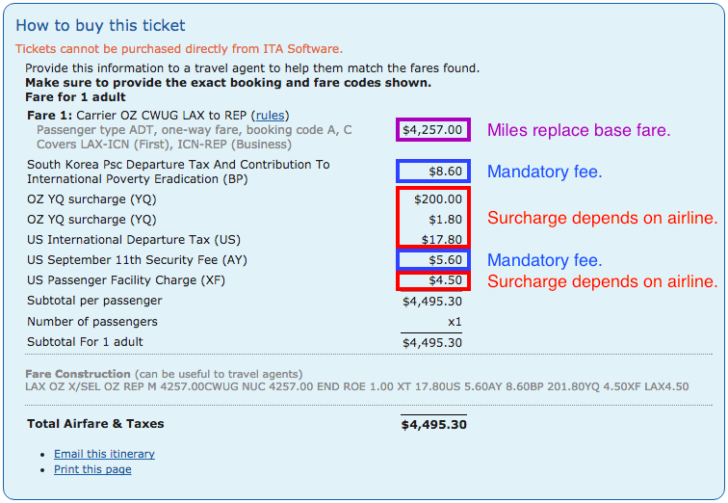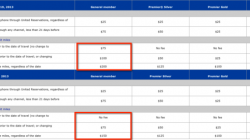There’s no such thing as free award travel. You will always have to pay some fees and taxes when you book an award ticket with United MileagePlus — fortunately no carrier surcharges apply. The question is how much? Three factors will determine what you have to pay, and you might decide to redeem miles with a different program to avoid extra costs.
Table of Contents and Related Posts
Reservation Fees
Reservation fees are set by the loyalty program — in this case United MileagePlus. Some of these fees are waived for members with elite status, while others aren’t. There may also be extenuating circumstances that enable you to get fees waived for other reasons, so it’s worth asking if you think you have a compelling argument.
$25 telephone reservations fee — If you need to call to book your award, you’ll pay $25 per ticket. Although United does a good job displaying award space for most carriers, it removed Singapore Airlines from its search tool last year. This is one fee that cannot be waived; United has stated it will charge booking fee even for travel that cannot be booked online.
$75 close-in ticketing fee — United charges $75 per person per ticket for travel booked within 21 days of departure. This fee is discounted to $50 for Premier Silver members and $25 for Premier Gold members. You may be able to avoid this fee if you book travel more than 21 days out and then change the award within 24 hours.
$75 change fee (> 21 days) — Any change involving a different cabin, carrier, date, time, or award type (e.g., heading to a new destination) will invoke a $75 fee per person. All elite members are exempted from this fee.
$100 close-in change fee — Any change that occurs within 21 days of travel incurs a higher fee of $100 instead of the usual $75. Not all elite members are exempted, although it is reduced to $50 for Premier Silver members and $25 for Premier Gold members.
$200 cancellation fee — Although its change fees are relatively low, United has the highest cancellation fee of any major U.S. carrier. This fee is reduced to $125 for Premier Silver members and $100 for Premier Gold members.
Taxes
There is little you can do to avoid government taxes. All award travel includes taxes, and they are determined by local governments — not the airlines. Generally speaking, you will pay more in taxes when you make additional connections because some taxes are applied on a per-segment basis to cover airport operations and security.
Some taxes can be avoided by making adjustments to your itinerary. For example, flights from Canada (not to) have about $50 in taxes that don’t exist on the U.S. side of the border. Driving from Vancouver to Bellingham could be cost-effective for a large group. Other taxes may penalize specific groups, such as the Air Passenger Duty (APD) that applies to travelers departing London. You can avoid the APD if you begin your travel outside of London, like Paris, and merely connect on your way somewhere else. If you must fly from London, keep in mind the APD increases for travelers in premium cabins vs. economy class.
Fortunately, taxes are pretty consistent no matter which airline you fly, so you don’t need to worry about making a strategic choice to redeem miles from one program or another.
Carrier-Imposed Surcharges
Sometimes known as “fuel surcharges” — although they no longer have much to do with the price of fuel — carrier-imposed surcharges are never collected by United Airlines when you book award tickets. However, many other Star Alliance partners allow you to book the same awards with fewer miles in their own programs. The catch is that they do collect surcharges, so you have to decide if it’s a worthwhile trade. I’ll briefly discuss how they work.
Three important factors determine if you will have to pay such surcharges:
- The airline that operates the plane determines if there is a surcharge.
- The airline that operates the loyalty program determines if you must pay the surcharge.
- Some routes don’t have surcharges at all.
What does this mean in practice? United Airlines won’t collect surcharges for any award tickets booked using their miles. It’s their policy. Other programs do collect them.
However, the loyalty program doesn’t have any say in the amount of the surcharge. That is entirely at the discretion of the airline that operates the plane, and it relates to how much they charge regular customers for the same flight. At the end of this post I discuss how you can look up this amount.
Finally, there are some routes operated that don’t have any surcharges. Such fees usually only apply to long-haul international flights. If you’re on a domestic flight, such as San Francisco to Honolulu, then there may not be a fee to collect. That doesn’t mean the policy is any different — if a surcharge existed, many of United’s partners would pass it on.
Estimating Taxes and Surcharges
Estimating the taxes and surcharges on an award ticket can be useful to compare options before booking an award. For example, one option might cost 60,000 miles and $50 while the other costs 50,000 miles and $500. Which would you rather choose? Some people want to save their miles, others want to save their cash. There’s no right answer, but you can’t decide unless you have the information.
You may be faced with multiple options using the same loyalty program to fly on different itineraries, or you might find that the same itinerary costs different amounts if you book it with different programs. The taxes are usually the same across programs. The fees vary a little. The surcharges (if any) are a policy decision as I just discussed and are usually the biggest dollar amount.
To find the taxes and surcharges, you will need to search for the same flight as if you were buying it with cash. Then find a breakdown that separates the total price into individual line items. The best free service that can do this is ITA Matrix. Read my introduction to ITA if you’re not familiar with it.
On the final page of your search, after you select your itinerary, you will find a breakdown of the price in a blue box. The base fare is listed first and is entirely covered by the miles you plan to redeem. The next item is usually a carrier-imposed surcharge (a.k.a “fuel surcharge”) and labeled “YQ” or “YR.” Not all flights have this surcharge. Remember that you need to familiarize yourself with program policies to determine if the airline will collect this surcharge or not. Finally, there will be a list of government taxes and fees that all programs collect.
Here’s an example from a one-way flight on Asiana that I recently booked in first class. I booked with Aeroplan, which does collect surcharges, mostly because I had lots of Membership Rewards points and wanted to preserve my more limited United miles for other purposes. I also spent 22,500 fewer miles per person.

The blue and red boxes total up to $238.80 — the exact amount that I paid Aeroplan for each passenger in addition to the miles I redeemed. However, note that the red boxes include some other fees that aren’t labeled “YQ.”
Booking this same award with United MileagePlus, which does not collect a surcharge, results in only $14.20 in fees. That number comes from the mandatory poverty eradication fee and the September 11th security fee. The passenger facility charge and departure tax are dependent on the surcharge, which in turn is dependent on the policy of the loyalty program.
No surcharge = fewer taxes, too. See how one domino leads to another?

